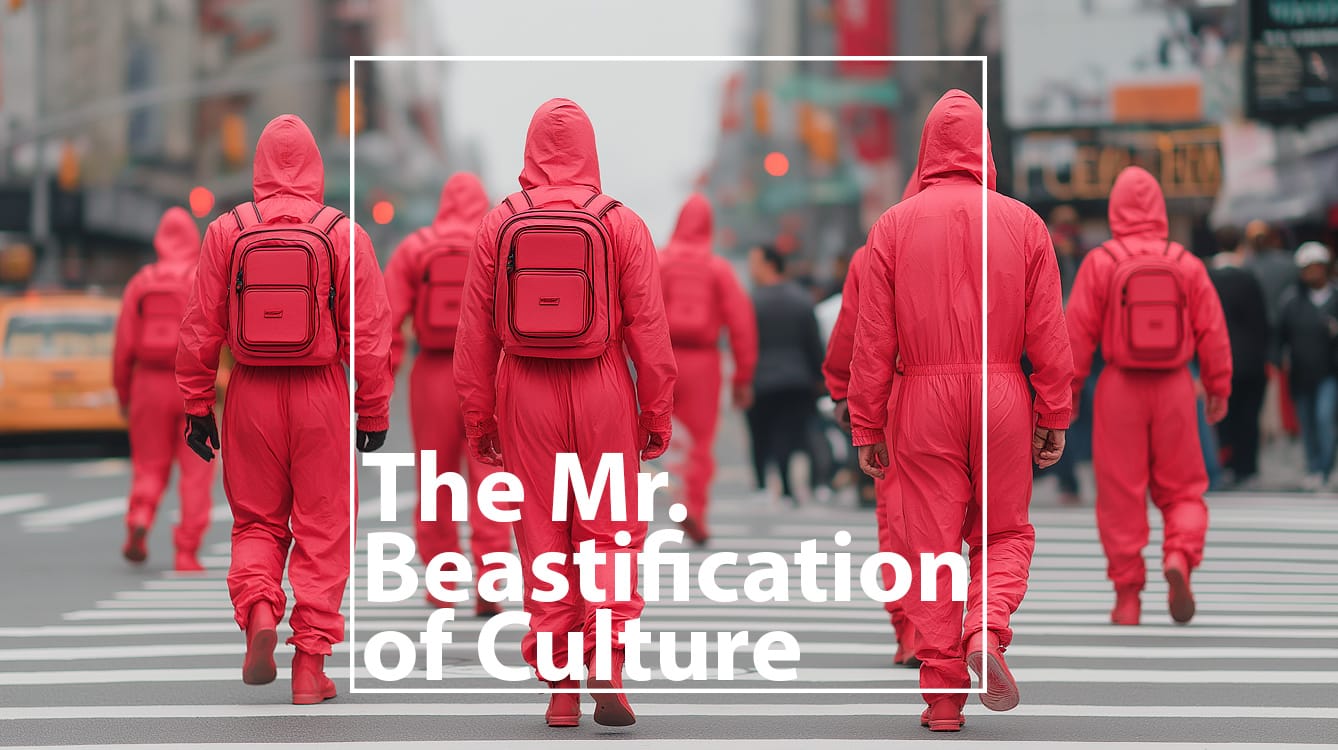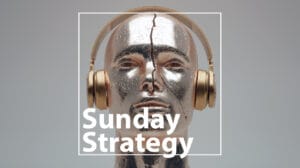Modern life has taken on the feel of a high-stakes game show. Turn on the TV, go to a movie, or visit YouTube, and you’ll see mounting examples of ordinary people taking on extraordinary challenges for life-changing money. As The Running Man remake arrives in cinemas (with a promotional campaign where TikTok debates what people would do for a billion dollars), Squid Game dominates Netflix before becoming reality TV, and ESPN’s Pat McAfee invites students to kick field goals for up to $1 million every Saturday on College GameDay, we’re witnessing challenge culture everywhere.
The format isn’t new, and times of economic desperation have always been ripe for promises of quick wealth. Nothing, however, typifies this moment more than the rise of Jimmy “Mr Beast” Donaldson—the most-subscribed individual YouTuber in the world and the undisputed king of big-money challenges. In 2024, Vox claimed entertainment had been taken over by Mr. Beast. A year later, it’s more accurate to say wider culture has followed suit.
There’s Always Been a Beast, Even Before the Mr.
This cultural shift began long before Mr Beast launched his YouTube channel in 2012 at age 13. Looking back 100 years, we find Depression-era American “dance marathons”, where people danced for days to win cash prizes and meals (dramatized in the 1969 film They Shoot Horses, Don’t They?). Suffering as entertainment lacked the live reach it has today, but it carried a similar feel.
What existed on a dance floor a century ago now lives across media everywhere. The economic forces remain eerily similar: diverging wealth distribution, a lack of financial security, and an increasingly foreboding stock market. But media attitudes and behaviors have evolved, creating a different dynamic.
Steinbeck’s 1966 observation that Americans saw themselves as “temporarily embarrassed millionaires” has eroded. A 2024 Charles Schwab study found only 21% of Americans believe they’re on track to become wealthy (defined as an average of $2.5 million). Yet a 2022 survey—conducted during the height of cryptocurrency trading and speculative investing, found 44% of Americans claimed they “had the tools available to become a billionaire.”
This paradox is revealing: Modern Americans are simultaneously realistic about their immediate finances and the difficulty of the economy, yet easily convinced that their fortunes could change overnight. Someone is making money, and with the right—albeit unclear—moves, it could be them. America is no longer a nation of embarrassed millionaires; it’s a nation of potential ones.
The Social Media Goldrush vs. a Broken Career Ladder
This tension intensifies as wage stagnation and collapsed career progression collide with upended ambitions. Social media isn’t just inflating expectations of wealth—it’s promising a pathway toward it. A 2024 poll of American children aged 12 to 15 found one-third want to be YouTubers and one-fifth want to be TikTok creators. Another study found 54% of adults aged 18 to 60 would quit their day jobs if they thought they could make a full-time living as content creators, and 41% claim to know someone who has made money as a social media influencer.
While seeing others get ‘rich’ instantly usually drives resentment and raises expectations, a Canadian study found lottery winners’ neighbors were more likely to go bankrupt, social media gives a sense that it could happen for all of us if we just figure it out
The Growth of Mr. Beast: From YouTube to the Real World
This sense of potential hasn’t just turned cautionary tales like Squid Game into actual reality shows—it has supercharged the format that Mr. Beast and others refine on social media. Starting with videos featuring himself, friends, and ordinary people taking on made-for-YouTube challenges like “Last to Leave the Circle Wins $500,000” and “$456,000 Squid Game in Real Life,” he harnessed our natural interest in spectacle to help his content proliferate across channels.
In late 2024, he moved his concept onto Amazon Prime Video with ‘Beast Games’, seeing 1,000 contestants compete for a $5m grand prize. The show offered ‘generational wealth’, framing the game, as Vox put it, in terms of escaping poverty not just for one’s self but for a whole family line. The Amazon show has been wildly successful, becoming the platforms #1 show in over 80 countries and one of its most watched unscripted vehicles.
Now, the format has entered physical space. Beast Land, a theme park in Riyadh, brings YouTube challenges into the real world. Active for 45 days during Riyadh Season 2025, this temporary installation lets attendees compete for daily cash prizes and larger prizes at season’s end. The park transforms the sense of potential viewers see in videos into tangible experiences—likely as a test run for a more permanent venture.
To blame Mr Beast for an increase in challenge culture is unfair. While he’s the most prominent mascot of this cultural shift, recently lampooned on SNL, he isn’t solely responsible. He is simply the most adept amongst a growing ecosystem of creators and wider cultural moments that tap into our sense of potential wealth. As we consider chances to become rich and famous through social media, a collective ‘gold rush’ has permeated society. From odds-based market places like Kalshi to air traffic controllers who worked during the US government shutdown being issued surprise checks as prizes, we’ve traded a broken career ladder for a lottery or gameshow.
Will We Step Back from Challenge Culture?
How far can this go? This cultural shift has rendered cautionary tales like The Running Man and Squid Game into aspirational vehicles. Anyone who doubts we could modernize gladiatorial combat for modern media should look at the UFC match planned for the White House lawn. With an economy that appears poised to worsen before improving, we may not be able to look away or stop ourselves from engaging.
The best chance for a shift away from the “Mr Beastification of Society” may come from increasing absurdity – challenges and prizes falling out of equilibrium. As competition for attention intensifies, the need for spectacle grows faster than what we’re realistically able to do as contestants. Short of literally staging The Running Man, there comes a point where the task may not justify the prize. As SNL‘s Kenan Thompson puts it when his character reveals he’s “living as a clock” for a year in return for $2,500: “Come to think of it, that’s not really a lot of money.”
Shame, or better yet a renewed sense of value, may be the only thing that keeps us from all finding ourselves on YouTube one day.





